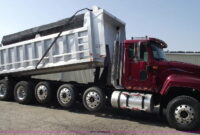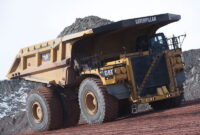Understanding Dump Truck Hydraulic Fluid Type: Selection, Properties, and Maintenance catdumptruck.com | Hydraulic fluid is a critical component in a dump truck’s hydraulic system, enabling smooth operation, efficient power transmission, and system longevity.
Choosing the right hydraulic fluid type is essential to maintain performance, reduce wear, and prevent system failures.
With various hydraulic fluids available, understanding their differences, properties, and maintenance requirements is crucial for dump truck operators and mechanics.
This article provides an in-depth look at dump truck hydraulic fluid types, their functions, selection criteria, and best maintenance practices.
Read More: RC Dump Truck Hydraulic System
Understanding Dump Truck Hydraulic Fluid Type: Selection, Properties, and Maintenance
What is Hydraulic Fluid?

Hydraulic fluid is a specially formulated liquid that transmits power within the hydraulic system. It lubricates components, dissipates heat, prevents rust, and removes contaminants, ensuring smooth operation of the dump truck’s lifting mechanism.
Common Type of Hydraulic Fluids Used in Dump Trucks
Selecting the appropriate hydraulic fluid is vital to prevent operational inefficiencies and component damage. The most commonly used hydraulic fluids include:
1. Petroleum-Based Hydraulic Fluids
The most commonly used type.
Provides excellent lubrication and heat dissipation.
Includes additives for anti-wear, anti-foaming, and oxidation resistance.
Ideal for standard dump truck applications.
2. Synthetic Hydraulic Fluids
Engineered for high-performance and extreme temperature conditions.
Superior resistance to oxidation, thermal breakdown, and viscosity fluctuations.
Often used in dump trucks operating in harsh environments such as extreme heat or cold.
3. Biodegradable Hydraulic Fluids
Eco-friendly alternatives made from vegetable oils or synthetic esters.
Reduce environmental impact in case of leaks or spills.
Suitable for applications in environmentally sensitive areas like forestry and agriculture.
4. Water-Based Hydraulic Fluids
Contain a high percentage of water for fire-resistant applications.
Less commonly used in dump trucks due to potential corrosion issues.
Primarily found in specialized industrial hydraulic systems.
Dump Truck Hydraulic Fluid Type
Key Properties of Hydraulic Fluids
To function efficiently, hydraulic fluids must possess specific properties, including:
- Viscosity
Determines the fluid’s resistance to flow.
Must be balanced to ensure smooth operation in varying temperatures.
- Lubrication and Anti-Wear Protection
Reduces friction between hydraulic components, preventing premature wear.
Protects pumps, cylinders, and valves from damage.
- Thermal Stability
Ensures the fluid remains stable under high temperatures.
Prevents oxidation and sludge buildup that can clog the system.
- Oxidation Resistance
Prevents the formation of sludge and deposits.
Extends the life of hydraulic components.
- Water Separation
Hydraulic fluid should repel moisture to prevent corrosion and system contamination.
Essential for preventing fluid degradation.
- Foam Resistance
Minimizes air bubbles in the fluid, which can lead to poor system performance.
Enhances fluid stability and pressure consistency.
Dump Truck Hydraulic Fluid Type
How to Select the Right Hydraulic Fluid for Your Dump Truck
Choosing the correct hydraulic fluid involves considering several factors:
- Manufacturer Recommendations
Always refer to the truck or hydraulic system manufacturer’s guidelines.
Using the recommended fluid ensures compatibility and optimal performance.
- Operating Temperature
Select a fluid with an appropriate viscosity range to accommodate temperature fluctuations.
Synthetic fluids may be required for extreme hot or cold conditions.
- Load and Pressure Requirements
Heavy-duty dump trucks may require high-performance fluids with superior anti-wear properties.
- Environmental Impact
In environmentally sensitive areas, biodegradable hydraulic fluids are the preferred choice.
- Compatibility with System Components
Ensure the fluid is suitable for use with seals, hoses, and other hydraulic components.
Incompatible fluids may cause swelling, hardening, or deterioration of rubber seals.
Dump Truck Hydraulic Fluid Type
Common Hydraulic Fluid Issues and Troubleshooting
Despite proper selection and maintenance, hydraulic fluids can still encounter issues. Here are common problems and their solutions:
1. Hydraulic Fluid Contamination
Causes: Dirt, water, or metal particles entering the system.
Solution: Regularly check and replace filters, and use high-quality, clean fluid.
2. Overheating of Hydraulic Fluid
Causes: Low fluid levels, excessive load, or poor cooling.
Solution: Maintain proper fluid levels, use the correct fluid type, and ensure the cooling system functions properly.
3. Foaming and Air Bubbles
Causes: Low-quality fluid, improper fluid levels, or leaks in the suction line.
Solution: Use recommended hydraulic fluid and check for leaks or improper connections.
4. Hydraulic Fluid Leaks
Causes: Worn-out seals, cracked hoses, or loose fittings.
Solution: Inspect and replace damaged seals, hoses, and fittings as needed.
Dump Truck Hydraulic Fluid Type
Hydraulic Fluid Maintenance Best Practices
Proper maintenance of hydraulic fluid is essential to prolong system life and ensure reliable operation. Follow these best practices:
- Regular Fluid Level Checks
Monitor hydraulic fluid levels and top up when necessary.
- Routine Fluid Changes
Replace hydraulic fluid at manufacturer-recommended intervals to maintain system efficiency.
- Use Quality Hydraulic Fluid
Choose high-quality, manufacturer-approved hydraulic oils to prevent contamination and wear.
- Monitor for Contamination
Regularly inspect fluid for dirt, water, or metal debris.
Use filters and breathers to prevent contaminants from entering the system.
- Keep the System Sealed
Ensure all connections, hoses, and seals are properly fitted to prevent leaks and air intrusion.
- Test Fluid Condition
Periodically analyze the fluid for signs of degradation, such as discoloration or sludge formation.
- Flush the System When Necessary
If contamination is detected, flushing the hydraulic system may be required before adding new fluid.
Conclusion
The type of hydraulic fluid used in a dump truck plays a crucial role in system efficiency, performance, and longevity. Choosing the correct fluid based on manufacturer recommendations, operating conditions, and environmental considerations is essential for optimal operation.
By following proper fluid maintenance practices, monitoring fluid conditions, and troubleshooting issues proactively, dump truck operators can prevent costly breakdowns and extend the lifespan of their hydraulic systems.
Ensuring the right hydraulic fluid is used contributes to improved safety, reliability, and overall productivity on the job site.
- Dump Truck Size in Meters: A Comprehensive Guide - April 26, 2025
- Dump Truck Size in Yards: A Complete Guide - April 26, 2025
- Mining Dump Truck Size: A Detailed Overview - April 26, 2025



